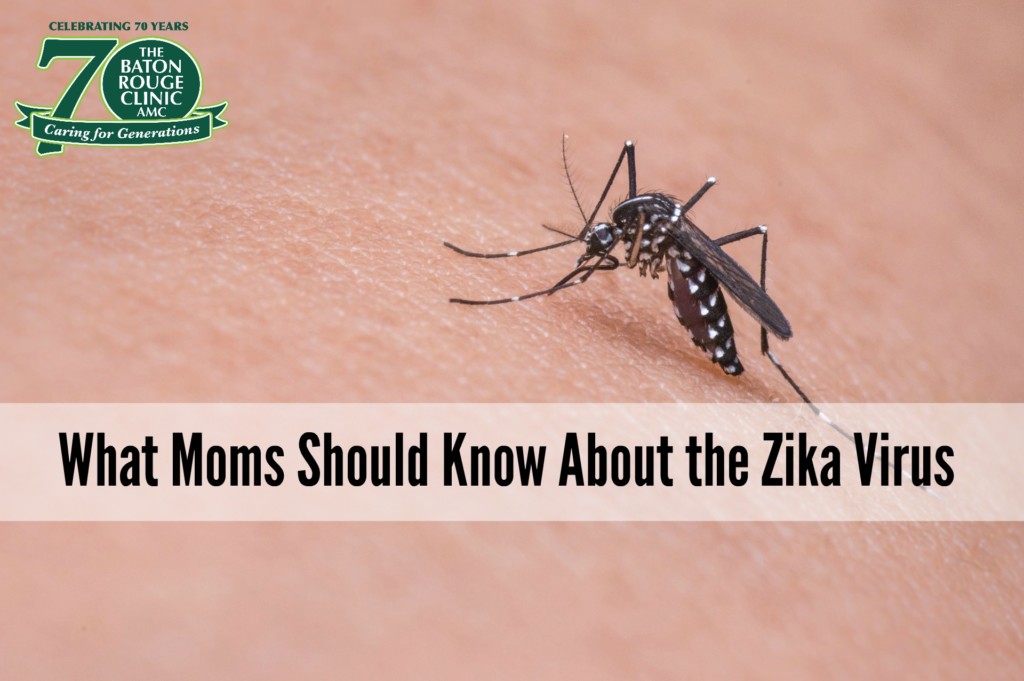Disclosure :: This post is sponsored by The Baton Rouge Clinic. That said, we very much feel that this information about the Zika virus is timely, relevant and important for all moms to read.
What Moms Should Know About the Zika Virus
Zika virus… these two words have been the center of some recent media attention and a source of anxiety for many women. Although there are still many unknowns about the virus, here is some information about  the topic to better inform fellow moms from a pediatrician’s perspective.
the topic to better inform fellow moms from a pediatrician’s perspective.
What is Zika Virus?
Zika virus is an arboviral disease, meaning it is transmitted to humans through mosquito bites. Prior to 2015, the virus was mainly found in Africa and Asia; however, it was detected in South America in 2015. Since then, it has spread to twenty-six other countries, all of which can be found on the Center of Disease Control (CDC) website. While there have been over 1500 travel-associated cases reported in the U.S., the first locally acquired Zika virus infection in the U.S. was announced in Miami, Florida on July 29th. Don’t overreact just yet – at this time, no infected mosquitoes have been found in Louisiana. However, research is ongoing. For the latest news regarding infection areas, travel recommendations, or new findings about the virus, please visit the CDC website.
How is Zika virus transmitted?
Zika is primarily transmitted through the bite of an infected Aedes mosquito, which are prevalent in Louisiana. At the time of this article’s publishing, no infected mosquitoes have been found in our state. The most concerning result of infection, and most likely what you’ve read in the news, is that the virus can be transmitted from a pregnant mother to her fetus. Interestingly and fortunately, experts believe it is safe to breastfeed even if the mother is infected with Zika virus, as no transmission has been reported through maternal milk. Transmission through sexual contact is also possible; therefore, men should take precautions against preventing the disease as well.
What are the risks associated with Zika virus?
The long -term effects of Zika virus are not yet known, as research on the virus is ongoing. We do know that it is typically a mild illness for children with symptoms including fever, rash, sore joints or conjunctivitis (inflamed red eyes). Most children who are infected have no symptoms or have a very mild illness. Similar symptoms are found in infected adults. Per the CDC, the time between being bitten by an infected mosquito and developing symptoms of the disease is anywhere from 3 days to 2 weeks.
As most of you know, the biggest concern is for pregnant women. The link between microcephaly (smaller than normal head measurement at birth) and Zika virus infections during pregnancy has stirred up a lot of attention on the topic. At this time, it is unclear at which point of pregnancy the virus is most dangerous if contracted.
If my child has any symptoms of Zika virus, will they be tested by his or her doctor?
I know what you are thinking – My child has or has had symptoms of fever, red eyes, rash or sore joints. Does it mean they have or had Zika virus? Do they need to be tested?
Not to worry, the symptoms of the Zika virus in children coincide with many viral illnesses we see on a normal basis in a pediatrician’s office. The key to determining whether or not your child should be tested lies in the travel history of your child. Testing should be considered in children who have traveled to an area affected by Zika virus in the past two weeks and have two or more of the following symptoms: fever, rash, conjunctivitis, or sore joints. Testing is not routine at this time unless there is strong suspicion for Zika; however, children under two weeks of age whose mother traveled to an affected area within two weeks of delivery and have more than two of the above manifestations should be tested specifically for Zika. If testing is deemed necessary, your pediatrician will contact the local health department to determine the proper testing technique based on your child’s age. As a general rule of thumb, the pediatrician should be notified immediately if any child under eight weeks of age develops a fever (100.4 or greater). Communication with your doctor is key!
How can we protect ourselves and our children?
Before you plan your next family vacation outside the United States, first check the CDC website prior to travel for any warnings and updates on infected areas.
Second, if pregnant or considering becoming pregnant, a discussion with your OBGYN is an important step before making travel plans to an infected country.
For you and your family, prevention of mosquito bites is the most important focus!
Mosquito Bite Prevention Tips:
Wear lightweight long pants and sleeves in wooded areas or during afternoon hours when mosquitoes are more prevalent
- Get rid of any standing water near your home.
- Insect repellants are crucial to protecting children from bites. The Environmental Protection Agency states insect repellant can be used in children two months and older. 10% to 30% DEET is safe for children over two months of age. 10% DEET protects for about 2 hours and 30% protects for about 5 hours. Picaridin is another insect repellant that has less potential for toxicity as compared to DEET. It is best to apply the repellant to the skin and to the outside of the clothing in an outside area to minimize inhalation of repellant. Do not spray the repellant directly onto your child’s face; instead, apply to your hands and gently rub to face avoiding contact with eyes and mouth. New products combining DEET and sunscreen are also available; however, because the sunscreen component needs to be applied more frequently, it may overexpose the child to DEET and should therefore be avoided. Once the child is inside, be sure to thoroughly wash the repellants off their bodies.
- It is best to avoid scented body wash, perfumes or hair spray on your child, as these can attract insects.
- For children under two months who cannot use repellent, mosquito netting can be used to cover infant strollers or carriers while outside.
As a mom, I know this is a topic that causes anxiety, but being informed and educated about both the virus and prevention of the virus is the best way to alleviate that fear. I hope you find these tips informative and useful and that they answer some of your questions on the topic. If any further questions arise, our Baton Rouge Clinic pediatricians will gladly address your concerns. Now, grab some insect repellent and go enjoy the rest of the summer!
Would you like to learn more about the Baton Rouge Clinic?
Website | Facebook | Twitter | Phone :: (225) 246-9290


















